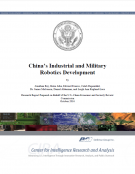×
Filter Results
Filter Results

Contracted Research
The report examines the growth of China’s robotics industries and its development of unmanned industrial, service, and military systems, such as drones and driverless cars. The report assesses the economic and national security implications of these trends for the United States.
Trade Bulletin
Sector focus – Market barriers to U.S. drugs, medical devices, and medical services
